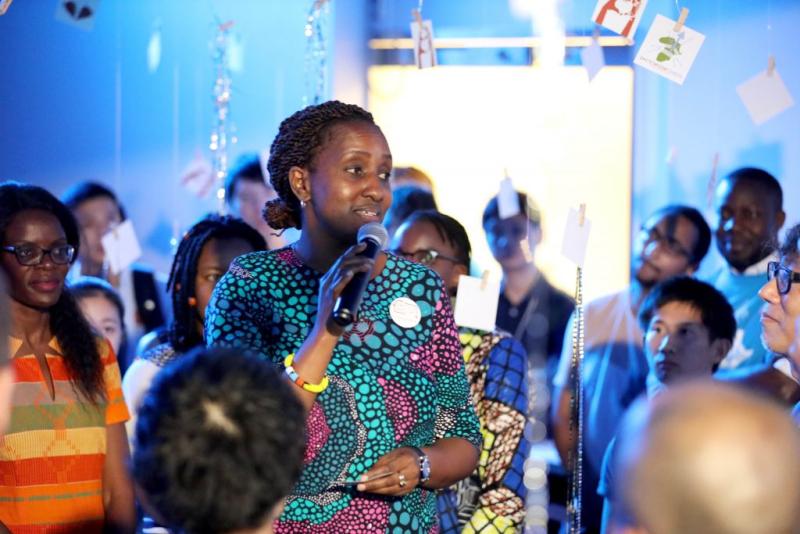Where We Work
See our interactive map


Dr. Janet Muriuki addresses a group of attendees at SwitchPoint Shibuya. Photo courtesy of The Global Fund/Shugo Takemi.
A conversation with two physicians about the mental health realities of a career in medicine.
The people who attend to us when we’re ill, injured, worried about our health, or scared for the well-being of our loved ones are face-to-face with conflict, end of life, and terminal illness. But are health students adequately prepared to work under such mental stress? According to Health economist and health policy analyst Dr. Akiko Maeda, these issues aren’t properly addressed in schools and in the design of health systems management.
“Health workers are people, too,” she said at IntraHealth’s side event at the Tokyo International Conference on African Development (TICAD) last month. “They’re not just machines that churn out services—and they are under tremendous stress.”
I spoke to two medical doctors at SwitchPoint Shibuya to get their thoughts: IntraHealth’s Janet Muriuki, who provides technical leadership on our Human Resources for Health project in Kenya; and Zolelwa Sifumba, South African TB advocate and doctor at Prince Mshiyeni Memorial Hospital.
Muriuki: It’s supposed to be a noble career—but these health workers are human; and sometimes in the African setting you have challenges. Perhaps the government delays salary payment, or you’re expected to work in rural areas where work tools needed for the job are not available nor the social amenities to support a family lifestyle. People don’t understand and can’t reconcile not getting paid for careers perceived to be high-flying, because they think “the brightest can’t have challenges.”
Sifumba: You face these things but also, you’re just like everyone else. You're dealing with normal life things at the same time. Then you’re also dealing with seeing death all the time. You're in the situations where you could make a mistake and it costs a life. How can we deal with that? I struggle.
Muriuki: There’s a lot of work pressure, loneliness, and mental illness.
It changes us to see death and to bring life into the world.
Sifumba: Most of medical school is about biology. They make sure that you discuss all the aspects of care, but there’s not much teaching on how to nurture yourself in the workplace. They're preparing us to give—as medical professionals we are givers.
Muriuki: Working in the health sector, there’s a focus on hard technical skills. But as health becomes digitized, you must produce a workforce with both technical skills and transversal (soft) skills. So that the human touch never gets lost in the process. Because if you lose that human touch, the machines will take over. That's not something that’s taught in the curriculum, and you see poor interpersonal skills, ethics, and integrity playing out.
Sifumba: It changes us to see death and to bring life into the world. Seeing decay. The hospital environment is very toxic. We see each other struggle at work. I make it my job—if I see that someone's not ok, I will check on them. We need monitoring like that. And we need to be evaluated on readiness and stability, not just on technical skills.
Muriuki: It’s key that health workers are prepared for how the work they do affects their mental health. You are taught about the glory, the great things, diagnosis of disease and prognosing life outcomes. But no one teaches coping mechanisms. You’ll see life, death, and illness—but nobody prepares us psychologically to deal with that.
Sifumba: We must be alerting people to the reality of what the workplace is like to prepare them. You're faced with lots of difficult things. We should have trainings, talks, and ongoing mentorship on what the workplace is like to create an honest, open environment. We need to build spaces where people who are in the profession can speak to students about the situations they’re going to face. We need to be at universities for interns—the transition between school and internships can be very chaotic. We need to focus on these transitions.
Muriuki: There's a need to input in the health education curriculum more about how people find the time to take care of our inner selves and use coping mechanisms. How to reconcile “today I helped a woman deliver, but I lost a mother at the same time.” Extreme highs and extreme lows happen all in one day. Health workers need help not to burn out or engage in destructive behavior. That may have to come with the education system teaching transversal skills and coping mechanisms in the face of difficult settings and circumstances.
There’s a projected global shortage of 18 million health workers by 2030. But this isn’t just about the head count.
“Think about the quality of the jobs themselves,” said Maeda. “If the jobs are dangerous, terrible, unattractive—it’s not enough. Let’s work toward creating quality jobs with decent wages, respect, and equitable and fair treatment.”
Read more about IntraHealth at TICAD here.

Dr. Zolelwa Sifumba tells SwitchPoint attendees how she contracted TB through her work in a hospital. Photo courtesy of the Global Fund/Shugo Takemi.
Get the latest updates from the blog and eNews




